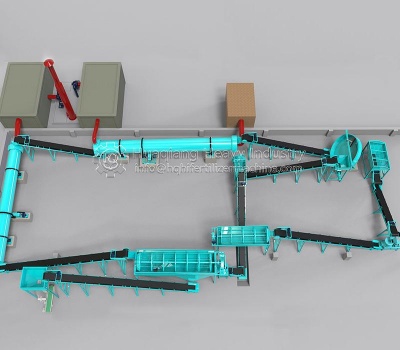Fertilization is a crucial link in agricultural production, which is directly related to the growth, yield and quality of crops. Mastering the tricks of fertilization not only allows crops to thrive, but also improves the fertility and sustainable use of the land. In the process of fertilization, fertilizer production machines also play an indispensable role.

The first step in applying fertilizer is to understand the properties of the soil and the needs of the crop. Different soil types have different levels of fertility and nutrient content, and different crops have different nutrient requirements at different stages of growth. Through soil testing and crop nutrient diagnosis, it is possible to determine which nutrients are lacking in the soil and which fertilizers need to be supplemented at various growth stages of the crop.
For example, some soils may be deficient in major nutrients such as nitrogen, phosphorus, and potassium, while others may be deficient in trace elements such as iron, zinc, and boron. For different crops, such as food crops, cash crops and vegetables and fruits, their nutrient requirements also vary greatly. After understanding these needs, we can choose the right fertilizer to fertilize.
On the basis of understanding the soil and crop needs, choosing the right fertilizer is the key to fertilization. At present, there are many kinds of fertilizers on the market, including organic fertilizer, inorganic fertilizer, compound fertilizer and so on. Organic fertilizers such as decomposed farm manure, compost, etc., are rich in organic matter and microorganisms, which can improve soil structure and improve soil fertility. Inorganic fertilizers, such as nitrogen fertilizer, phosphate fertilizer, potassium fertilizer, etc., have high nutrient content, fast fertilizer efficiency, and can quickly meet the growth needs of crops. Compound fertilizer is to mix a variety of nutrients together, easy to use, and can meet the needs of crops for a variety of nutrients.
Advanced fertilizer production machines can precisely control the formula and nutrient content of fertilizers to ensure the quality and stability of fertilizers. For example, compound fertilizer production machines can accurately mix nutrients such as nitrogen, phosphorus, and potassium according to different soil and crop needs to produce special compound fertilizers suitable for different regions and different crops.
Fertilizer production machines also play an important role in controlling the amount and proportion of fertilizer applied. Some advanced fertilization equipment can precisely control the fertilizer amount and proportion according to the preset fertilization program to ensure the accuracy and science of fertilization. For example, the intelligent fertilizer applicator can monitor the nutrient content of the soil and the growth of the crop in real time through the sensor, and automatically adjust the fertilizer amount and proportion to achieve precise fertilization.
In short, the trick of fertilization is to scientifically and reasonably select fertilizers, determine the time and method of fertilization, control the amount and proportion of fertilization, and achieve precise fertilization with the help of the power of fertilizer production machines to bring more harvest and joy to agricultural production.
